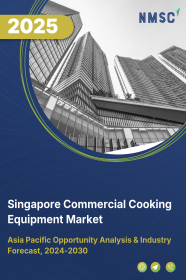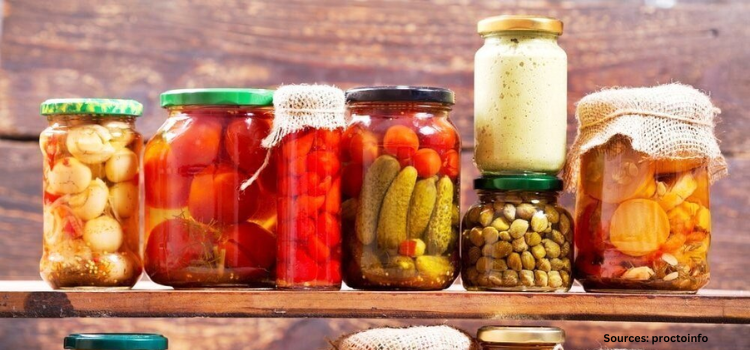
Singapore Commercial Cooking Equipment Market by Product Type (Broilers, Grills and Griddles, Cook Chill Systems, Refrigerators, Ovens, Dishwashers and Others), by Size (Small-Scale Equipment, Medium-Scale Equipment and Large-Scale Equipment), and by End-User (Full-Service Restaurants, Quick Service Restaurants, Catering, Railway Dining, Resorts & Hotel, Hospitals and Others)- Opportunity Analysis and Industry Forecast, 2024– 2030
Industry: Retail and Consumer | Publish Date: 27-Mar-2025 | No of Pages: 113 | No. of Tables: 80 | No. of Figures: 45 | Format: PDF | Report Code : RC2951
US Tariff Impact on Singapore Commercial Cooking Equipment Market
Trump Tariffs Are Reshaping Global Business
Singapore Commercial Cooking Equipment Market Overview
The Singapore Commercial Cooking Equipment Market size was valued at USD 29.7 million in 2023, and is predicted to reach USD 56.6 million by 2030, at a CAGR of 9.1% from 2024 to 2030. In terms of volume, the market size was 4 thousand units in 2023, and is projected to reach 10 thousand units by 2030, with a CAGR of 12.5% from 2024 to 2030
Commercial cooking equipment encompasses a variety of appliances and tools crafted for professional kitchens in restaurants, hotels, and catering businesses. Designed for efficiency and safety, this equipment is built with durable materials to endure continuous use, reducing downtime and ensuring a seamless kitchen workflow. Modern designs emphasize energy efficiency, helping businesses lower utility costs and environmental impact. Investing in top-tier hospitality cooking equipment is essential for maintaining smooth operations, enhancing competitiveness, and boosting profitability in the food service industry.
Expanding Singapore Foodservice Industry Drives Demand for Commercial Cooking Equipment
Singapore's foodservice industry, including restaurants, cafes, hotels, and catering services, is expanding rapidly, driving up the demand for commercial cooking equipment. As Singapore's tourism industry grows and consumer tastes diversify, there's a rising need for high-quality cooking gear to meet these demands. For instance, BMP Food Concept launched BMP@EXPO at the Singapore EXPO in early 2024, showcasing the industry's response to changing consumer preferences and the need for advanced cooking equipment to support diverse culinary operations across Singapore's dynamic foodservice sector.
Rising Tourism Drives the Growth of the Singapore Commercial Cooking Equipment Market Trends
Singapore's booming tourism industry is significantly boosting demand for commercial cooking equipment market across all segments of the food service sector. Every year, millions of tourists visit Singapore to explore its rich cultural heritage and diverse culinary scene. This influx has spurred local eateries and global dining spots alike to expand their menus and upgrade their kitchen equipment.
As a result, restaurants, cafes, hotels, and food trucks in Singapore are investing in advanced cooking appliances to meet the varied tastes of both local customers and international visitors. The strong recovery of Singapore's tourism sector in 2023, exceeding expectations in visitor arrivals and tourism spending, underscores the need for modern commercial cooking series to cater to a growing and discerning customer base.
Stringent Regulatory Requirements and Compliance Standards Hinder the Singapore Commercial Cooking Equipment Market Growth
Stringent regulatory requirements, such as the International Food Standards (IFS) and the Food Safety Modernization Act (FSMA), pose significant challenges for businesses investing in new food service equipment. These regulations, enforced by governmental agencies and industry associations, mandate specific protocols for food handling, storage, and preparation to ensure safety and compliance. Non-compliance can lead to penalties and reputational damage.
Moreover, meeting emissions standards necessitates investments in ventilation and filtration systems, increasing complexity and costs. These regulatory burdens, combined with the financial strain of purchasing compliant equipment and ongoing maintenance, particularly impact small and medium-sized enterprises (SMEs). Ultimately, these challenges hinder the adoption of new cooking equipment, constraining market growth and expansion in the food service industry.
Integration Of Advanced Technologies in CCE Creates Future Market Prospects
The adoption of advanced technologies like smart cooking appliances, IoT-connected kitchen equipment, and automation solutions is set to drive the Singapore commercial cooking equipment market demand in the coming years. These innovations enable businesses to enhance operational efficiency, productivity, and sustainability. Smart appliances equipped with sensors and connectivity features enable precise monitoring and control, optimizing cooking processes and enhancing food quality.
IoT-enabled equipment allows real-time data monitoring and analysis, empowering kitchen staff to make informed decisions and adjustments for improved performance. Automation solutions streamline repetitive tasks such as food preparation and cleaning, freeing up time for staff to focus on more value-added activities. This integration not only improves operational efficiency but also reduces energy consumption and waste, meeting the rising demand for sustainable practices in the food service industry.
Competitive Landscape
The key players operating in the Singapore commercial cooking equipment industry include Hoshizaki Electric Co., Ltd., Comcater, Kitchenaid Singapore, Caterquip, AB Electrolux, Carousell, Kyro Kitchen Equipment, Apollo Kitchen Equipments, Continental Equipment, Singapore Kitchen Equipment Limited, and others.
Singapore Commercial Cooking Equipment Market Key Segments
By Product Type
-
Broilers
-
Grills and Griddles
-
Cook Chill Systems
-
Refrigerators
-
Ovens
-
Dishwashers
-
Others
By Size
-
Small-Scale Equipment
-
Medium-Scale Equipment
-
Large-Scale Equipment
By End-User Industry
-
Full-Service Restaurants
-
Quick Service Restaurants
-
Catering
-
Railway Dining
-
Resorts & Hote
-
Hospitals
-
Others
Key Players
-
Hoshizaki Electric Co., Ltd.
-
Comcater
-
Kitchenaid Singapore
-
Caterquip
-
AB Electrolux
-
Carousell
-
Kyro Kitchen Equipment
-
Apollo Kitchen Equipments
-
Continental Equipment
-
Singapore Kitchen Equipment Limited
REPORT SCOPE AND SEGMENTATION:
|
Parameters |
Details |
|
Market Size in 2023 |
USD 29.7 Million |
|
Revenue Forecast in 2030 |
USD 56.6 Million |
|
Growth Rate |
CAGR of 9.1% from 2024 to 2030 |
|
Market Volume in 2023 |
4 Thousand Units |
|
Market Forecast in 2030 |
10 Thousand Units |
|
Volume Growth Rate |
CAGR of 12.5% from 2024 to 2030 |
|
Analysis Period |
2023–2030 |
|
Base Year Considered |
2023 |
|
Forecast Period |
2024–2030 |
|
Market Size Estimation |
Million (USD) |
|
Market Volume Estimation |
Thousand Units |
|
Growth Factors |
|
|
Companies Profiled |
10 |
|
Market Share |
Available for 10 companies |
|
Customization Scope |
|
|
Pricing and Purchase Options |
Avail customized purchase options to meet your exact research needs. |

















 Speak to Our Analyst
Speak to Our Analyst





















